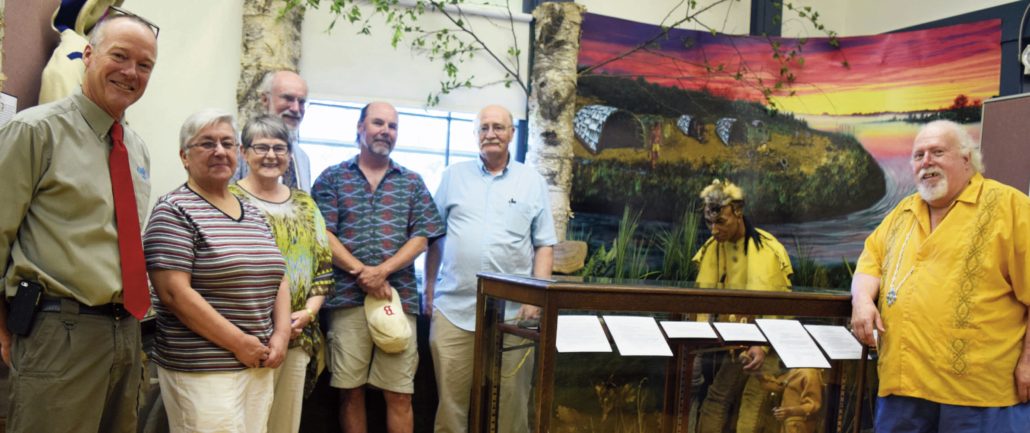
From left to right, Tony Jenkins, Natural Resources Conservation Service, Simone Antworth, VHS director, Jan Clowes, VHS president, Gary Shaffer, NRCS archaeologist, Stewart Corson, VHS director, Don Bassett, exhibit designer, and Russell Smith, VHS director. Photo by Tom Kielbasa, NRCS
by Thomas Kielbasa
NRCS-Maine
A new exhibit at a central Maine museum is the fruition of a unique partnership between the local community and the USDA to preserve prehistoric artifacts for future generations.
On June 10 the Vassalboro Historical Society officially unveiled the “Remembered Vision” display at its museum in East Vassalboro, highlighting the area’s prehistoric fishing roots. The new exhibit – which features stone tool artifacts and a diorama depicting a native village – was created with the help of funding provided by the USDA’s Natural Resources Conservation Service (NRCS) and volunteers with the Historical Society.
The “Remembered Vision” exhibit was funded in part by NRCS through a $5,000 National Conference of State Historic Preservation Officers (NCSHPO) award to promote the 50th anniversary of the National Historic Preservation Act. The Vassalboro Historical Society (VHS) matched the funds to complete the exhibit.
“It is amazing,” VHS President Janice Clowes said during a special reception at the opening of the exhibit. “The people who have seen it are amazed, and we are so excited about it.”
The exhibit was designed by freelance artist and former display coordinator with the Maine State Museum Don Bassett. Bassett incorporated into the exhibit more than 100 stone artifacts excavated from the nearby Cates family farm, which sits on the mouth of an outlet stream from China Lake and was the site of a seasonal fishing camp for prehistoric and native fishermen.
Bassett said his vision for the Vassalboro exhibit was to bring to the community “the knowledge base that for thousands of years there were people right here on the grounds, and it continued mostly around a seasonal fishing existence.”
“Remembered Vision” is quite literally a “window” into the past; the east-facing window in the exhibit looks out onto the Cates farm and the site of the prehistoric fishing camp.
Bassett explained that much of the farm’s soil is undisturbed and could provide “an enormous cache” of archaeological information, thanks to support from the local community. He said a water treatment facility had been planned for the site in the 1990s, but an outpouring of support from locals to preserve its integrity saved the China Lake site.
“Not only did they save the farm, but found property (elsewhere) for the water district to build their water treatment plant,” Bassett added. “…The community is very proud to have that site, and they are very proud of the museum.””

A carving at the new exhibit, which features stone tool artifacts and a diorama depicting a native village.
Photo by Tom Kielbasa, NRCS
Through the window of the exhibit a visitor can also see the siding of the High Tunnel System on the Cates farm that NRCS assisted with installing nearly two years ago.
The project began in 2014 when the Cates family sought NRCS assistance through the Environmental Quality Incentives Program (EQIP) to install a High Tunnel System to help prolong their growing season. NRCS-Maine Cultural Resources Specialist Dr. Gary Shaffer knew the significance of the site since previous excavations over the years had recovered prehistoric artifacts primarily from the Middle and Late Archaic periods; especially from about 6,000 to 4,500 years ago. Shaffer believed the installation or use of the high tunnel at the farm would only minimally disturb the archaeological site (the setting of stakes to anchor the structure to the ground), but future usage could impact the site. His own excavation recovered several ceramic sherds and metal artifacts from the 18th to 20th centuries, as well as a flake of Kineo rhyolite from prehistoric tool manufacture. Importantly, troweling of the B horizon soils in one test pit revealed the dark soil of a prehistoric fire pit. After removal of the black, greasy silt loam from the pit, Shaffer carefully screened the soil to collect even the smallest of artifacts and biological items. As a result, he found a calcined (burned) bone and several pieces of charcoal.
This bone was later identified as a mouth apparatus of an anadromous alewife fish in a charcoal pit that was around 4,000 years old; this “confirmed the presence of significant prehistoric archaeological resources in the footprint of the high tunnel” at the Cates’ farm, according to Shaffer.
It was this project that helped solidify the historic importance of the site and confirm the location’s eligibility for inclusion on the National Register of Historic Places (NRHP), a list with more than 90,000 properties of historical significance across the nation. Authorized by the National Historic Preservation Act of 1966, the National Park Service’s NRHP is part of a program to coordinate and support public and private efforts to identify, evaluate, and protect America’s historic and archeological resources.
“The Natural Resources Conservation Service was proud to be a part of this project in Vassalboro,” Shaffer said. “The Historical Society has truly done a great job with putting together this exhibit and ensuring generations to come will learn about the rich prehistory of this area of Maine.”








